
What the Frick After wasting $2 million of the National Archives of Australia’s dwindling resources trying to stop historian Jenny Hocking from accessing the Palace Letters, the archives’ director-general David Fricker spent even more yesterday making himself the star of the show.
At the release of the letters, Fricker insisted on leading a presentation about them while Hocking, who had only been given access to the results of her years-long campaign just an hour earlier, was trapped in Melbourne. Meanwhile, the archives’ website crashed.
Fricker, of course, is an ex-spook — a former ASIO deputy director-general and chief information officer. The National Archives’ website fail seems to be what happens when someone from an organisation trenchantly resistant to any kind of transparency is placed in charge of one that is supposedly committed to exactly those principles.
At the Crossroads Seems like everybody is talking about the Crossroads Hotel, the highway megapub in south-west Sydney that’s become the epicentre of the latest cluster of NSW coronavirus cases. Rumours are swirling about the Crossroads — we’re told it was Ivan Milat’s favourite watering hole (semi-true), and a notorious bikie hangout before a bistrofication turned it into “a stylish and modern family destination” (unconfirmed).
Here’s what we do know about the Crossroads: it’s a south-west Sydney stalwart, meaning most of the city’s eastern suburbs and inner-west-centric media class have never heard of it. There’s some truth to the Milat connection — the Milats were from the area, and during the investigation into the Milat backpacker murders police wiretapped a meeting between a family friend and Ivan’s brother Richard there in 1994.
The pub was an early acquisition of Arthur Laundy, a well-known Sydney pub baron whose son Craig was a Liberal minister and Turnbull’s last loyalist. It’s now owned by the Marlow Hotel Group, another suburban family pub empire. And like most suburban pubs, the family-friendly bistro aesthetic is a figleaf for the real money spinner — pokies. The Crossroads is one of the most profitable pokie venues in all NSW.
Pokies lobby gets a ringside seat Speaking of pokies, what was Australian Hotels Association NSW chief executive John Whelan doing standing next to Gladys Berejiklian during her press conference yesterday? In her presser, Berejiklian thanked the AHA, a major pokie lobby group, for being “proactive” in recommending fairly piecemeal new restrictions on pubs — bookings reduced from 20 to 10, a 300-person cap. The Star Casino, which a day earlier had been fined a measly $5000 for breaching social distancing rules, was of course exempt.
In NSW, you don’t have to look far to find evidence of the gambling lobby’s influence. When pubs closed, gamblers saved $2.5 billion. But NSW was the first state to reopen its pokie dens on June 1 (Scott Morrison initially suggested they’d be closed till July). ClubsNSW boasted of its success in bringing the government around. Groups like the AHA and ClubsNSW are consistently among Australia’s most generous political donors.
CSIRO gassed up In April, a CSIRO report, cited approvingly by Coalition MPs, concluded that fracking was safe for the environment. Alarm bells should’ve been ringing right away, because the report was put together by the CSIRO’s Gas Industry Social and Economic Research Alliance, a partnership which includes big frackers like Origin Energy, Santos and Shell.
Analysis by The Australia Institute pokes more holes in the industry-backed research effort. About 75% of the project’s funding was from Santos and Asia Pacific Liquid Natural Gas. GISERA’s report focused on just six sites — hand-picked by Santos. More worryingly, half of GISERA’s National Research Management Committee, which provides funding and strategic direction, are gas industry executives.








It is alleged that NT is on financial ‘bones of their . . . . .’ Further, the only way forward is to Frack? Even though emerging threat of recent reduced wet season deluges replenishing acquifers, rivers, and wetlands less and less reliable? Additionally, there are parallel pressures to plant broad acre crops such as cotton? Water and Climate security, increasingly of real concern?
CSIRO’s GISERA (Gas Industry Social and Economic Research Alliance) own Report findings must be read as open to question?
typo? or not? caption under photo of David Fricker….
You know what ficker is in German right?
I didn’t but I do now. Roughly describes what happened to their website. So he was Chief Information Officer at ASIO – didn’t seem to know much about providing information on the website.